An employee training system refers to the policies, programs, processes and tools companies use to train and develop their workforce.
Key components of an employee training system typically include:
Training Needs Assessmentz: Evaluating the skills and knowledge needed by the workforce to perform their roles effectively. This identifies training gaps.
Learning Management System (LMS): A software application used to deliver, track and manage training content and employee participation. Popular LMS platforms include Cornerstone OnDemand, SAP SuccessFactors, and Docebo.
Training Content: The information and materials used to actually train employees. Can include presentations, documents, videos, e-learning modules, etc.
Delivery Methods: How training content is delivered to employees. Common methods are instructor-led training, online courses, on-the-job training, coaching/mentoring, etc.
Training Resources: The facilities, equipment, technologies and staff utilized to support training initiatives. Resources like classrooms, computers, projectors and instructors.
Evaluation: Assessing the effectiveness of training programs via surveys, tests, observations, ROI measurements, etc.
Training Records: Documentation of employee training participation, scores and completion status. This supports compliance requirements.
You might like to know
Create an auto-grading quiz/assessment without any coding – try OnlineExamMaker today!
In this article, we explore the top 8 best employee training systems designed specifically for teachers. These innovative platforms offer a plethora of features, ranging from customizable course creation to real-time progress tracking and personalized learning pathways.
- 1. OnlineExamMaker
- 2. Google Classroom
- 3. TrainHub
- 4. Tovuti LMS
- 5. Acorn LMS
- 6. LearnPath
- 7. Brightspace
- 8. Open edX
1. OnlineExamMaker
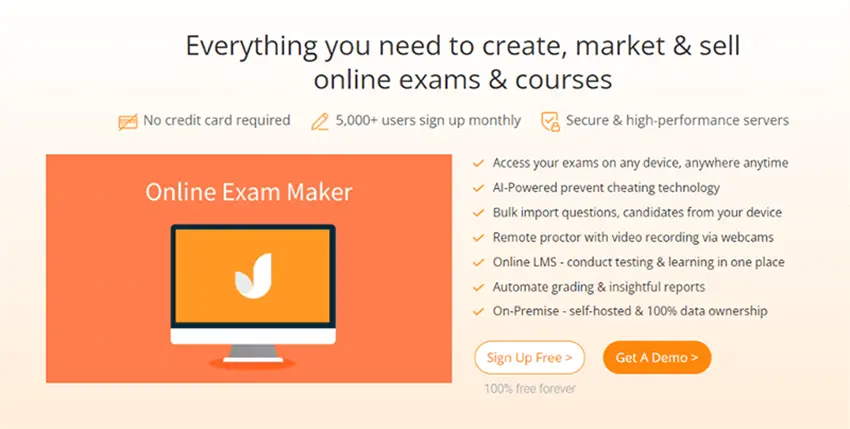
OnlineExamMaker is an awesome online exam platform with a comprehensive employee training system designed to streamline professional development within organizations. This cloud-based platform offers a wide range of features, including content creation, course management, progress tracking, and performance analysis.
OnlineExamMaker empowers HR departments and managers to create tailored training programs for employees, aligning with organizational goals and individual skill development needs. With interactive modules, gamified assessments, and mobile accessibility, the online LMS ensures engaging and accessible learning experiences for employees at all levels.
Pros:
• User-Friendly Interface: Easy to create and distribute online exams, courses.
• Customizable Content: The platform supports multimedia content and allows organizations to personalize training materials.
• Data Analytics: OnlineExamMaker provides insightful analytics to track employee progress and identify training gaps.
• Gamification Elements: Gamified assessments and rewards enhance employee motivation and participation.
• Mobile Compatibility: Employees can access training materials on-the-go via mobile devices.
Cons:
• Initial Setup: Setting up the platform and content may require some time and effort.
Pricing:
Free to use. OnlineExamMaker offers tiered pricing plans, starting at $19 per user per month for basic features. Advanced plans with additional customization and support are available on request.
Create Your Next Quiz/Exam with OnlineExamMaker
2. Google Classroom
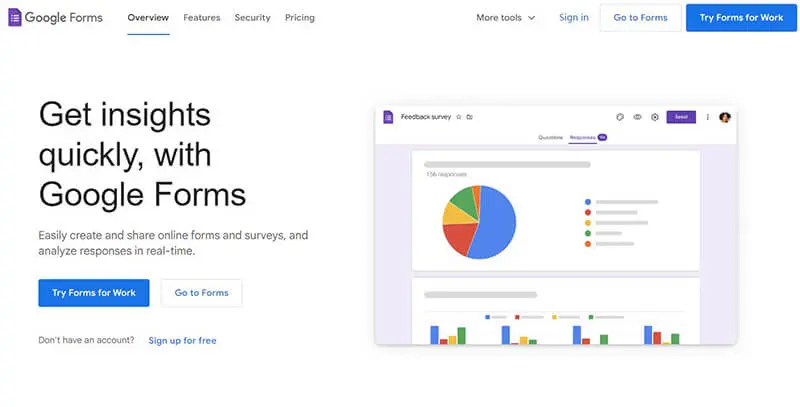
Google Classroom is a comprehensive and innovative learning management system designed to enhance the educational experience for both educators and students. As a part of the Google Workspace for Education suite, Classroom seamlessly integrates with other Google apps, offering a user-friendly platform for online learning and collaboration. With Google Classroom, teachers can easily create, distribute, and grade assignments, all within a paperless environment.
Pros:
• Easy Course Creation: LearnPro’s intuitive course builder simplifies content creation and updates.
• Flexibility: The platform supports various training formats to accommodate different learning styles.
• Comprehensive Analytics: Robust reporting and analytics help measure training effectiveness.
• Integration Capabilities: LearnPro seamlessly integrates with existing HR and performance management systems.
• Scalability: The platform can grow with the organization’s training needs.
Cons:
• Customization: Extensive customization may require technical expertise or additional support.
Pricing:
Free to use.
3. TrainHub
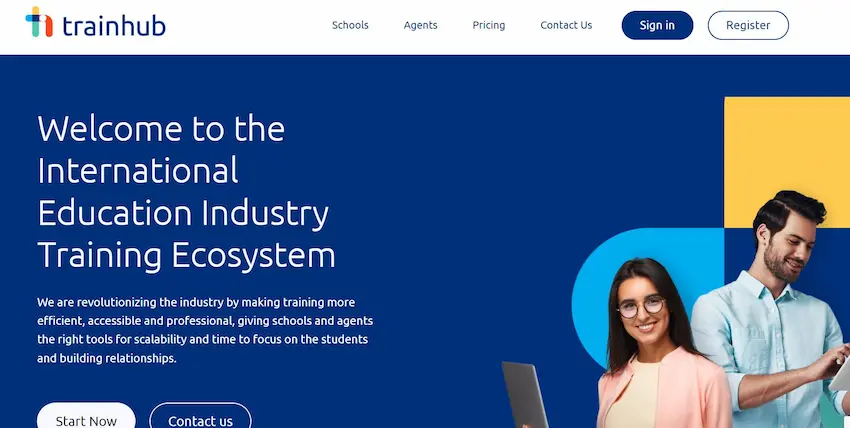
TrainHub is a comprehensive employee training system designed to streamline the learning process for organizations. The platform offers a diverse library of pre-built courses across various industries, including compliance training, soft skills development, and technical knowledge enhancement. TrainHub’s user-friendly interface and responsive design ensure that employees can access training materials from any device, facilitating on-the-go learning. The platform also includes robust assessment tools to gauge employee proficiency and provide immediate feedback, enhancing overall learning effectiveness.
Pros:
• Ready-Made Course Library: TrainHub provides a vast repository of pre-built courses for quick deployment.
• Mobile Accessibility: Employees can access training materials anytime, anywhere, promoting flexibility.
• Automated Assessments: Built-in assessment tools streamline evaluation and reporting processes.
• Affordable: TrainHub’s pricing is competitive for organizations with varying training needs.
Cons:
• Customization Limitations: Organizations with unique training requirements may face limited customization options.
• Reporting Complexity: Generating customized reports may require a learning curve for some users.
12. Pricing:
TrainHub offers subscription-based pricing, starting at $8 per user per month for unlimited access to the course library. Custom enterprise plans with additional features and support are available upon request.
4. Tovuti LMS
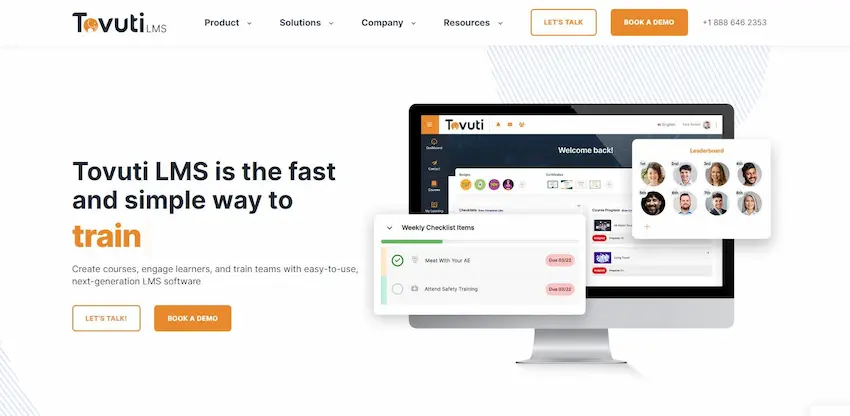
Tovuti LMS is a robust and user-friendly employee training system designed to empower organizations to develop a skilled workforce effectively. With an emphasis on personalized learning paths, Tovuti LMS offers employees access to a wide range of courses and resources tailored to their individual development needs and career aspirations. The platform’s advanced analytics and reporting tools enable HR managers to track employee progress and identify skill gaps, facilitating data-driven decision-making for training initiatives. Tovuti LMS also supports social learning features, allowing employees to collaborate, share knowledge, and foster a culture of continuous learning.
Pros:
• Personalized Learning: Tovuti LMS offers tailored learning paths for individual skill development.
• Advanced Analytics: Robust data analysis provides insights into training effectiveness and employee performance.
• Social Learning: Collaboration features promote peer learning and knowledge sharing.
• User-Friendly Interface: Tovuti LMS’s intuitive platform requires minimal training for employees and administrators.
Cons:
• Integration Challenges: Full integration with existing HR systems may require technical support.
• Initial Setup: Customizing the platform to align with specific organizational needs may take time.
Pricing:
Tovuti LMS offers a variety of pricing plans based on the number of users and desired features.
5. Acorn
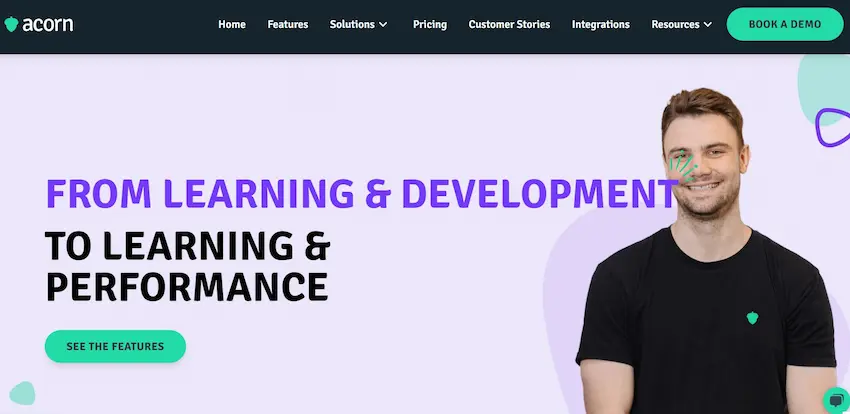
Acorn LMS is a cutting-edge Learning Management System (LMS) that empowers organizations to deliver engaging and effective learning experiences. With a focus on simplicity, scalability, and innovation, Acorn LMS caters to businesses of all sizes, from small enterprises to large corporations.
Acorn LMS provides a user-friendly interface that makes course creation, management, and delivery a breeze. Its intuitive design allows administrators to quickly upload and organize training content, ensuring a seamless learning journey for employees and learners.
Pros:
• Extensive Course Library: Acorn LMS provides a broad spectrum of courses catering to various learning needs.
• Gamified Learning: Gamification elements enhance learner motivation and engagement.
• Progress Tracking: Comprehensive reporting tools aid in measuring the impact of training initiatives.
• Scalability: Acorn LMS can accommodate the training needs of growing organizations.
Cons:
• Content Customization: Organizations seeking highly specialized content may require additional customization.
Pricing:
Book a demo from Acorn website.
6. LearnPath
LearnPath is a flexible and customizable employee learning & assessment system designed to empower organizations to deliver tailored learning experiences. The platform offers a wide range of features, including content creation, multimedia support, assessments, and certifications. LearnPath’s intuitive interface allows HR teams and managers to build comprehensive training programs that align with business objectives and employee development goals. The platform’s built-in collaboration tools encourage peer-to-peer learning and knowledge sharing, fostering a collaborative learning culture within the organization.
Pros:
• Customizable Learning Paths: LearnPath supports personalized learning journeys for employees.
• Collaboration Features: Built-in tools promote social learning and peer engagement.
• Certifications and Badges: Employees can earn certifications and badges for completed courses.
• Reporting and Analytics: Data-driven insights aid in measuring training impact and employee performance.
Cons:
• Learning Curve: Customizing complex learning paths may require some training.
• Integrations: Full integration with certain HR systems may require additional setup.
Pricing:
LearnPath offers a tiered pricing model based on the number of users and desired features. Starting at $11 per user per month, the basic plan includes core functionalities. Advanced plans with more customization options and premium support are available at additional costs.
7. Brightspace
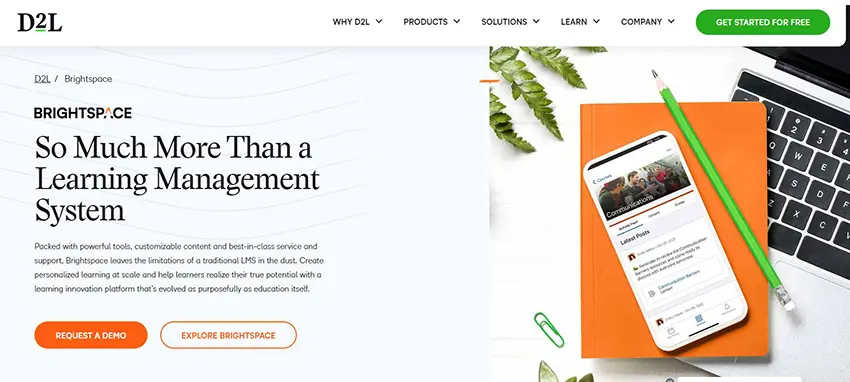
Brightspace is a comprehensive employee training system designed to identify and nurture talent within organizations. The platform focuses on skill development, succession planning, and career progression. Brightspace offers a competency-based training approach, allowing employees to assess their skills and access targeted learning resources to bridge gaps. The platform’s talent management features enable HR professionals and managers to identify high-potential employees and create tailored development plans for individual career growth.
Pros:
• Competency-Based Training: Brightspace’s focus on skills helps align training with organizational goals.
• Succession Planning: The platform aids in identifying and nurturing future leaders within the organization.
• Career Pathing: Employees can access learning resources aligned with their career aspirations.
• Talent Analytics: Data-driven insights facilitate effective talent management and development.
Cons:
• Course Library: The platform may have a smaller library compared to broader employee training systems.
• Complexity: Implementing comprehensive succession plans may require additional support.
Pricing:
Brightspace offers customized pricing based on the organization’s size and specific needs. Organizations can contact the sales team for detailed pricing information and a tailored quote.
8. Open edX
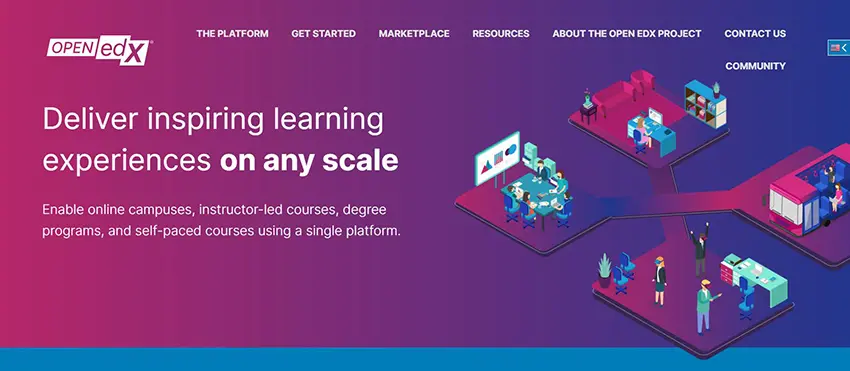
Open edX is a widely adopted open-source Learning Management System (LMS) that has revolutionized online education. Developed and maintained by a global community of educators, technologists, and institutions, Open edX aims to provide high-quality and accessible learning experiences to learners worldwide.
As a leading employee traning software, Open edX offers a feature-rich platform that allows educational institutions, businesses, and individuals to create, deliver, and manage online courses and training programs. The platform supports a wide range of interactive and engaging learning materials, including video lectures, quizzes, assignments, discussion forums, and collaborative projects.
Pros:
• Open-Source: Free and customizable eLearning platform.
• Interactive Course Content: Video lectures, quizzes, and assignments.
• Flexibility and Scalability: Customize to suit diverse educational needs.
• Collaborative Learning Environment: Engage learners with discussions and peer assessments.
• Multilingual Support: Reach global audiences with translated content.
• Analytics and Reporting: Track learner progress and engagement.
• Self-Paced Learning: Set personalized learning journeys for students.
Cons:
New users may spend several days to get started with the software interace.
Pricing:
Contact Open edX for a pricing quote.